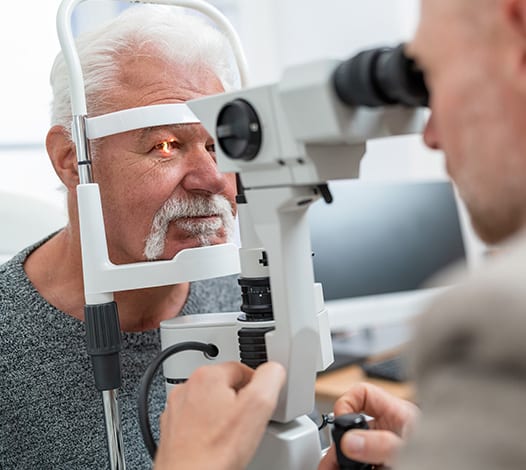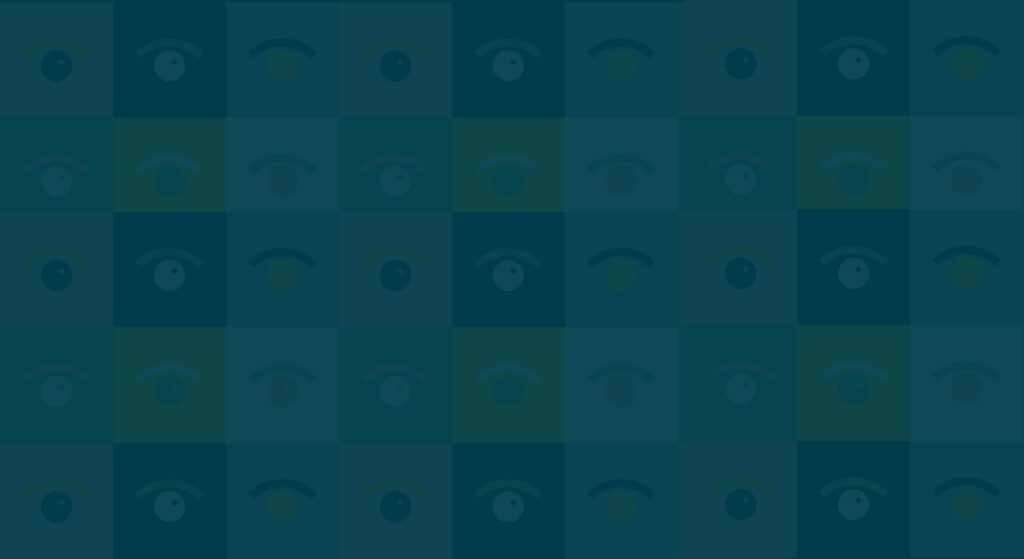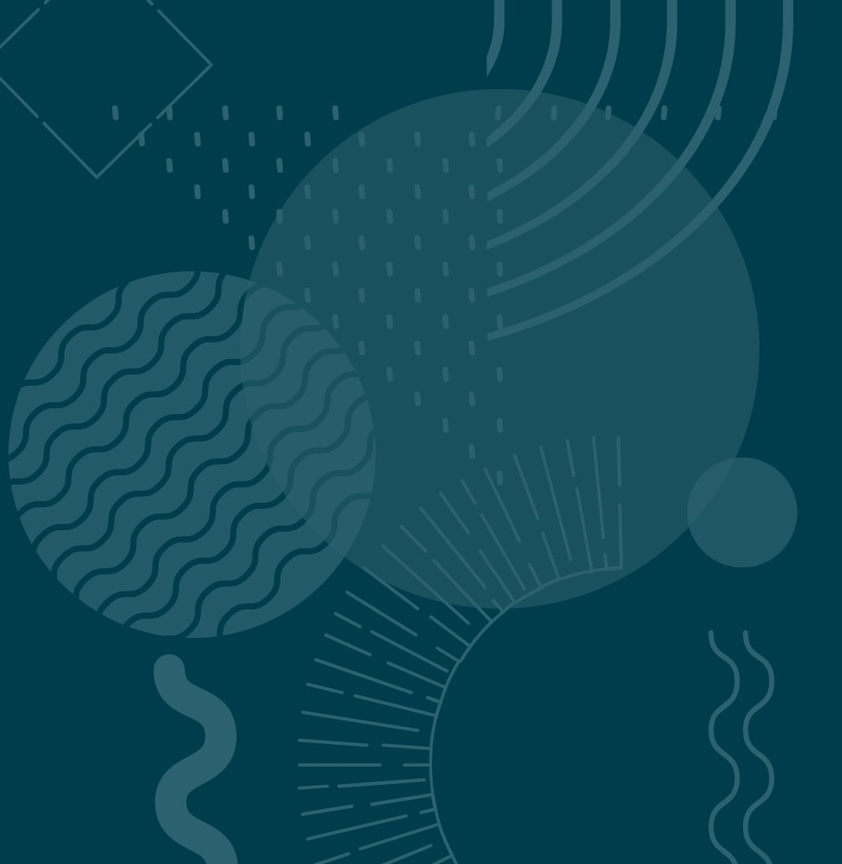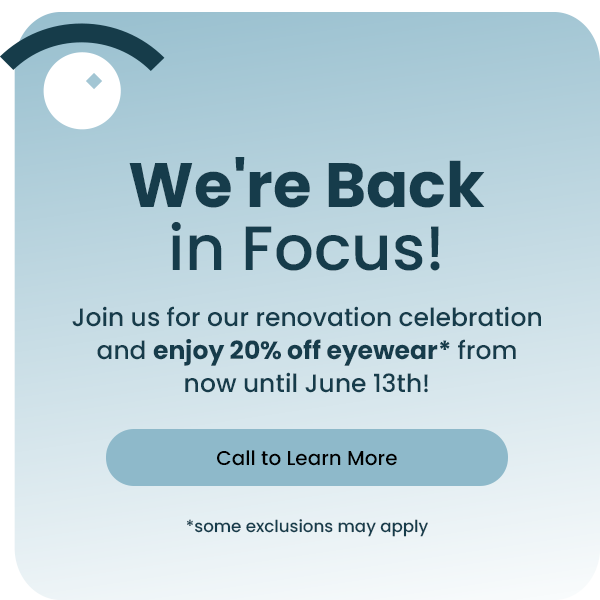Protect Your Vision with Preventive Care
Some of the most common and serious eye diseases, like glaucoma, macular degeneration, and diabetic retinopathy, often start with no noticeable symptoms. Routine eye exams are crucial to protecting your long-term eye health. The earlier we detect an issue, the more effective our treatment options become.
Our team provides comprehensive eye disease diagnosis and ongoing management to help preserve your sight and quality of life. If you’re living with a chronic eye condition, our experienced team is here to guide you through every stage of care with clarity and compassion.
Eye disease can be effectively managed if caught early. Contact us to schedule your next eye exam today.


Am I at Risk for Eye Disease?
Eye diseases can affect anyone, but some people are more at risk than others. Age is a major factor, especially after 60, as are chronic conditions like diabetes and high blood pressure. A family history of eye disease can also raise your risk.
Even without symptoms, early signs may be developing. Regular eye exams are essential to help detect changes before vision is affected.
Common Eye Diseases & How We Can Help
Our team diagnoses and manages a range of eye diseases with personalized, easy-to-understand care. If you’ve recently been diagnosed with an eye disease, it’s important to know what this means and what your options are.
Here’s a closer look at the 4 most common conditions we monitor and treat in our practice.
Glaucoma damages the optic nerve and is often linked to high pressure inside the eye. It usually develops slowly and without symptoms until noticeable vision loss begins. Glaucoma typically affects the peripheral (side) vision.
While glaucoma can’t be cured, early treatment can help slow or prevent progression. Treatment often includes prescription eye drops and regular monitoring, and we work closely with ophthalmologists when surgery is required.
Cataracts occur when the lens of the eye becomes cloudy, usually due to aging. Common symptoms include blurry vision, glare from lights, and faded colours. While cataracts typically don’t cause sudden vision loss, they can gradually impact your ability to see clearly over time.
We provide ongoing monitoring and co-manage surgical referrals when the time is right. Post-surgery, we welcome patients back for a 6-week follow-up exam to support healing.
Age-related macular degeneration (AMD) affects the central part of your vision, which is crucial for reading, driving, and recognizing faces. It tends to develop in people over 50 and may progress slowly or quickly, depending on the type (dry or wet AMD).
In its early stages, AMD may not show symptoms, but an eye exam can detect signs before vision is affected. We monitor macular health closely and may recommend lifestyle changes, like vitamin supplementation or stopping smoking.
This diabetes-related condition damages the blood vessels in the retina and can cause vision loss if not managed. Symptoms may include blurred vision, floaters, or sudden vision changes, but often, it starts silently. People with diabetes need routine eye exams to check for early signs of retinal changes. Early treatment can help preserve vision and support overall health.
Our Diagnostic Technology
We use modern, noninvasive technology to help us detect eye diseases early, often before symptoms appear. These tools allow us to assess your eye health in detail and monitor changes over time so we can tailor your care.
- Visual field testing: Measures how much you can see out of the corners of your eyes, helping us track conditions like glaucoma.
- Optos: Ultra-widefield retinal imaging that gives us a detailed look at the back of the eye, often without needing dilation.
- iCare tonometry: A quick, gentle way to measure eye pressure without the puff of air—ideal for detecting glaucoma risk.
- Optical coherence tomography (OCT): A noninvasive scan that captures high-resolution images of your retina and optic nerve.
Symptoms to Look Out For
Many eye diseases develop gradually and often without noticeable symptoms in their early stages, which makes regular eye exams essential. If you experience any of the following symptoms, something more serious may be going on.
- Eye pain
- Teary or watery eyes
- Trouble seeing at night
- Difficulty making out faces
- An increase in flashes of light or floaters
- Loss or decrease in vision, even temporary
- Blurred vision or changes in colour perception
Even if they seem mild, booking an eye exam as soon as possible is crucial. Early detection gives us the best chance to protect your vision and treat problems before they progress.
Your Partner in Eye Health
At Spectrum Eyecare & Eyewear, we’ll help you manage and treat your eye condition. Whether we’re monitoring your eye pressure, coordinating cataract care, or helping you stay on top of regular exams, you can count on us to keep your care on track.
Contact us to schedule your next eye exam today.

What Services We Have to Offer
Get to Know the Brands We Carry

- Chanel
- Cartier
- Maui Jim
- Lindberg
- Oliver Peoples
- DITA
- ZeroG
- Tom Ford
- Ray-Ban
- Dita Lancier
- Prada
- Coach
- Chanel
- Cartier
- Maui Jim
- Lindberg
- Oliver Peoples
- DITA
- ZeroG
- Tom Ford
- Ray-Ban
- Dita Lancier
- Kate Spade
- Coach
- Prada
Visit Our Fredericton Location
Fredericton
You can find us on the corner of Prospect and Hanwell, right across from Riverview Ford. While coming up Prospect, look out for the fun mural on the side of the building!
Hours
Address
- 550 Prospect Street
- Fredericton, NB E3B 6G9
Contact Us
Check Out Our Google Reviews


Visit Our Minto Location


Minto
Visit us at the corner of Logue Road and Queen Street (one street back from Main) on Mondays and Wednesdays. We have plenty of parking available.
Hours
Open Monday & Wednesday
9:00 AM – 5:00 PM
Address
- 253 Logue Road
- Minto, NB E4B 3XR



